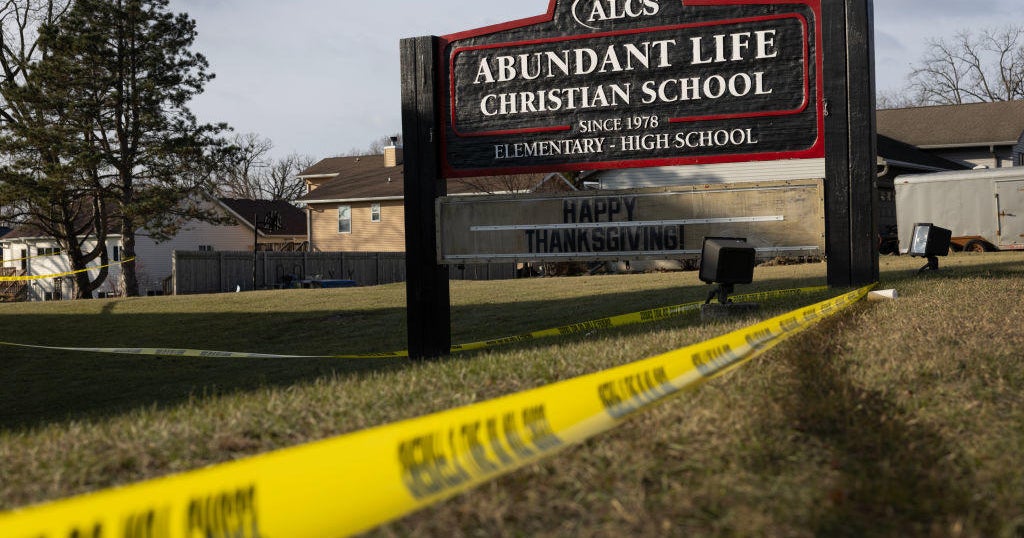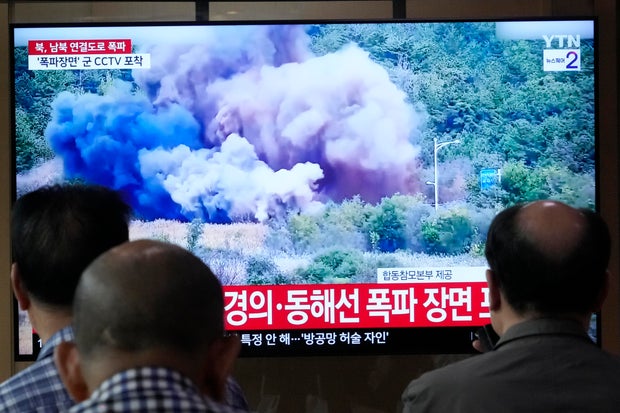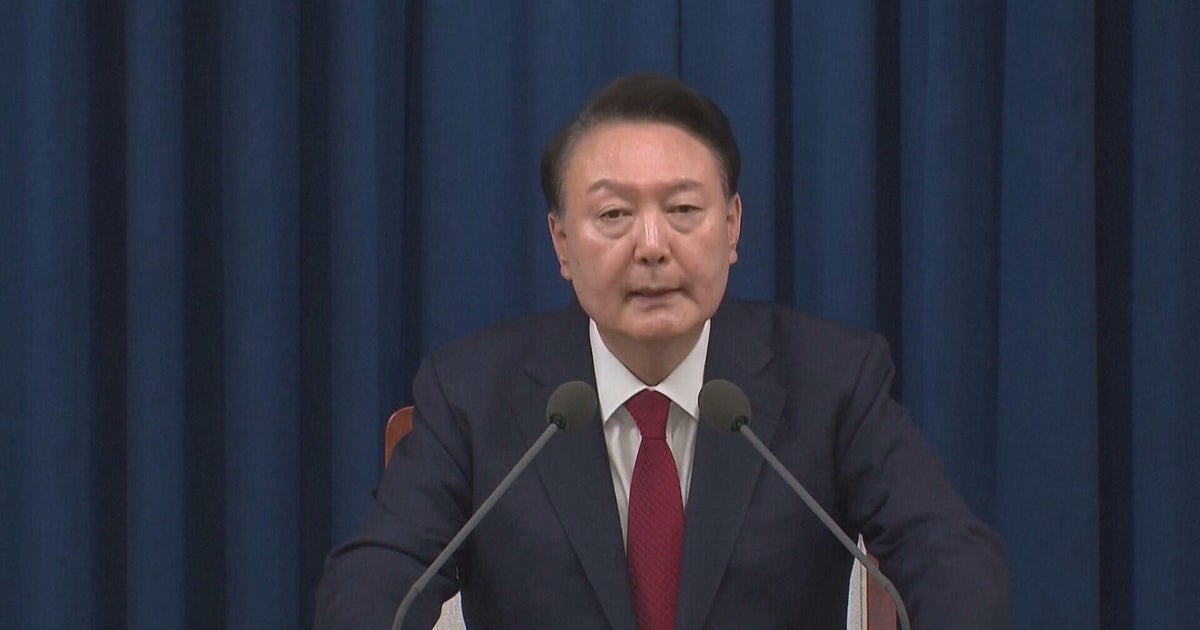CBS News
North Korea blows up parts of inter-Korean roads on its territory, South says, as tensions between the two keep rising

Seoul, South Korea — North Korea blew up the northern parts of inter-Korean roads no longer in use on Tuesday, South Korea said, after the rivals exchanged threats of destruction amid rising animosities over North Korea’s claim that South Korea flew drones over its capital.
The roads’ demolition is a display of North Korea’s growing loathing of South Korea’s conservative government as its leader, Kim Jong Un, has vowed to sever relations with South Korea and abandon the goal of achieving peaceful Korean unification.
Ahn Young-joon / AP
Observers say it’s still unlikely that Kim will launch preemptive, large-scale attacks on South Korea because that would certainly invite massive retaliation by the superior South Korea-U.S. force, which would pose a threat to his survival.
South Korea’s Joint Chiefs of Staff also the South’s military fired warning shots south of the military line dividing the two nations, adding that the shots didn’t cause any damage on Seoul’s side of the border. It wasn’t immediately known whether North Korea responded.
South Korea’s military has said it’s bolstering its readiness and surveillance posture in coordination with the United States.
Video provided by South Korea’s military showed a cloud of white and gray smoke emerging from the explosion at a road near the border town of Kaesong and North Korea sending trucks and excavators to clear out the debris. Another video showed smoke emerging from a coastal road near the Korea’s eastern border.
Yang Moo-jin, president of the University of North Korean Studies in Seoul, told Agence France-Presse Pyongyang might also intend to put up more physical barriers along the border and the road detonations could be “preparatory work for its construction of those walls.”
North Korea has a history of staging choreographed events to destroy facilities on its soil as a political message.
In 2020, Pyonyang blew up an empty, South Korean-built liaison office building just north of the border in retaliation for South Korean civilian leafleting campaigns. In 2018, North Korea demolished tunnels at its nuclear testing site at the start of nuclear diplomacy with the U.S. In 2008, the North blew up a cooling tower at its main nuclear complex when earlier disarmament-for-aid negotiations with the U.S. and others were alive.
Destroying the roads would be in line with Kim’s order in January to eliminate the goal of a peaceful Korean unification, formally designate South Korea as the country’s “invariable principal enemy” and define the North’s sovereign, territorial sphere. Kim’s order stunned many Pyongyang observers outside North Korea because it seemed to break from his predecessors’ long-cherished dreams of unifying the Korean Peninsula on the North’s terms.
Experts say Kim likely aims to diminish South Korea’s voice in the regional nuclear standoff and seek direct dealings with the U.S. They say Kim also probably hopes to diminish South Korea’s cultural influence and bolster his rule at home.
North Korea has accused South Korea of infiltrating drones to drop propaganda leaflets over Pyongyang three times this month and threatened to respond with force if it happened again. South Korea has refused to confirm whether it sent drones but warned North Korea would face the end of its regime if the safety of South Korean citizens is threatened.
North Korea put frontline artillery and other army units on standby to launch strikes on South Korea, if drones from South Korea are found over North Korea again. North Korea’s Defense Ministry said all of South Korea “might turn into piles of ashes” following the North’s powerful attack.
North Korea’s state media reported earlier Tuesday that Kim had called a meeting with his top military and security officials the previous day. During the meeting, Kim described the alleged South Korean drone flights as the “enemy’s serious provocation” and laid out unspecified tasks related to “immediate military action” and the operation of his “war deterrent” for defending the country’s sovereignty, the North’s Korean Central News Agency said.
During the previous era of inter-Korean detente in the 2000s, the two Koreas reconnected two road routes and two rail tracks across their heavily fortified border. But their operations later were suspended one-by-one as the Koreas wrangled over North Korea’s nuclear program and other issues.
Last week, North Korea said it would permanently block its border with South Korea and build front-line defense structures to cope with “confrontational hysteria” by South Korean and U.S. forces. South Korean officials said North Korea had been adding anti-tank barriers and laying mines along the border since earlier this year. They said North Korea has also planted mines and removed lamps along its sections of the inter-Korean roads and taken out ties on the northern side of the railways.
Tensions on the Korean Peninsula have sharply increased in recent years, with North Korea performing a run of provocative missile tests and South Korea and the U.S. expanding their military drills.
CBS News
12/18: The Daily Report – CBS News

Watch CBS News
Be the first to know
Get browser notifications for breaking news, live events, and exclusive reporting.
CBS News
Teacher, student killed in Wisconsin school shooting identified

A teacher and student killed in a shooting earlier this week at a school in Madison, Wisconsin, were identified Wednesday by authorities.
The Dane County Medical Examiner’s Office said in a news release provided to CBS News that 42-year-old Erin West and 14-year-old Rubi Vergara were fatally shot Monday morning at Abundant Life Christian School.
Preliminary examinations determined the two died of “homicidal firearm related trauma.” Both were pronounced dead at the scene, the medical examiner said.
An online obituary on a local funeral site stated Vergara was a freshman who leaves behind her parents, one brother, and a large extended family. It described her as “an avid reader” who “loved art, singing and playing keyboard in the family worship band.”
West’s exact position with the school was unclear.
The medical examiner also confirmed that a preliminary autopsy found that the suspected shooter, 15-year-old Natalie Rupnow — a student at the same school — was pronounced dead at a local hospital Monday of “firearm related trauma.” Madison Chief of Police Shon F. Barnes had previously told reporters that Rupnow was pronounced dead while being transported to a hospital.
Police had also previously stated that she was believed to have died from a self-inflicted gunshot wound.
The shooting at the private Christian K-12 school was reported just before 11 a.m. Monday. In addition to the two people killed and the shooter, six others were wounded.
Police said the shooting occurred in a classroom where a study hall was taking place involving students from several grades.
A handgun was recovered after the shooting, Barnes said, but it was unclear where the gun came from or how many shots were fired. A law enforcement source said the weapon used in the shooting appears to have been a 9 mm pistol.
and
contributed to this report.
CBS News
Last-minute government funding bill in limbo after opposition from Trump, others

Watch CBS News
Be the first to know
Get browser notifications for breaking news, live events, and exclusive reporting.










